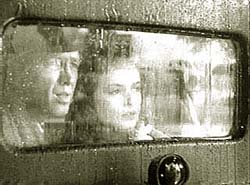I thought it had its heart in the right place, this movie. But where it should have a heart, it had a camera. Now, the editing, color, and overpowering framing of a bright, blank Kenya in early scenes offer so much promise. I’ll leave it to others to identify what went wrong in the choices of the DP and director. But the story cheated viewers out of nearly every moment of identification with human feeling.
First, expectations. The Constant Gardener could have been a thriller, a who-dunnit, a tragedy, a David v. Goliath crusade. Director Fernando Meirelles and screenwriter Jeffrey Caine could have woven together exciting combinations of these. The look and feel gives the impression that was their aim. But they repeatedly show and then steal questions we want answered: Is Justin’s wife really the dead woman found on the road? Answered. How is her death connected with her investigation into Three Bees corporation and its clinical trails? Answered. Did the British government play in a role? Answered. The Kenyan government? Answered. My friends? Liars and betrayers. By the midpoint when Justin is convinced that Tessa is a casualty of big pharma geopolitical profiteering, the viewer no longer knows what question matters. Justin gets on a train to Amsterdam without a plan, and so does the movie.
Why do Tessa, Justin, Arnold, and Sandy do, well, what they do? Love. But we do not see this, we hear it. It comes by conversation and incidental action. In a scene rife with possibility, Tessa lays in a hospital bed nursing a black newborn. The movie toys with us – is this the crusading Kenyan doctor’s child after all? – and then points us to the baby’s teen mother, who is dying nearby. Tessa is moved with compassion and outrage for the woman. But sharing the feeling demands knee-jerk sentimentalizing from the audience. We know nothing about the teenager or others like her. The filmmakers treat her death as an emblem not a person, much they way Tessa accuses the drug corporations of treating Africans as statistics. We do not feel because the moment is not particular.
Justin’s surrender to his own murder is the moment when I wanted to start throwing Milk Duds. Even if we had watching him face his assassins and drop the clip from his pistol, we could have called him oddly courageous because we saw his choice. It remains unclear why he felt so trapped that he should volunteer to be killed.
To cap the disappointments, at Justin’s funeral we learn that the late-appearing hero is – ta da! – Tessa’s cousin and lawyer, Ham. Justin made sure that Ham held the crucial evidence to would bring down the British senior diplomat Sir Bernard Pellegrin. While it was Justin’s unseen hand at work, the dramatic action belongs to a secondary character. And if this outing had been the first in a series of stylish third act revelations prepared and planned by the dead Justin, we would have cheered him as the avenging martyr. As it played, he wasn't clever, impassioned, good, or wise. And his company makes for a long two hours.
John’s critique rubric: Darkness Visible's critiques are for educational purposes only. It's hard to make a good movie. Respek, bro!
skip to main |
skip to sidebar

Yes, we have RSS feeds!


A hard look at stories to learn about writing movies

Yes, we have RSS feeds!
Principles
It all started with, "I could write a movie that bad." Turns out, even that's hard. So...
- Appreciate what's admirable.
- Identify what's slack; examine why.
- Think fast and publish quickly because writing stories, not blogging, is the real deal.
Affirmations (or "Get off your ass!")
Luck is opportunity plus preparation plus luck. - Jane Espenson ~~ Don't let better be the enemy of good. - John August ~~ The business must eat stories. Don't wait. - Eric Jacobson ~~ The screenplay is a container for money. - John David Roberts ~~ Things are OK when the things you complain about are the things you used to dream about. - Aaron Sorkin
About Me

- John David Roberts
- I'm an experienced learning and OD professional, who's onto the what's new in learning, and in my few hours of spare time I write screenplays.
Seen and Read, 2007 (Screenwriter)
- Jimmy the Gent (Bertram Milhauser)
- To Be or Not to Be (Edwin Justus Mayer)
- The Cabinet of Dr. Caligari (1962, Robert Bloch)
- Notorious (Ben Hecht)
- The Treasure of Sierra Madre (John Huston)
- Down in the Valley (David Jacobson)
- Daddy Long Legs (Henry Ephron, Phoebe Ephron, Jean Webster)
- The Bells of St Mary's (Leo McCarey, Dudley Nichols)
- The Bishop's Wife (Leonardo Bercovici, Charles Brackett, Robert E Sherwood, Billy Wilder)
- Atonement (Christopher Hampton)
- Breach (Adam Mazer, Wm. Rotko, Billy Ray)
- Charlie Wilson's War (Aaron Sorkin)
- Enchanted (Bill Kelly)
- Disturbia (Christopher B Landon, Carl Elsworth)
- Because I Said So (Karen Leigh Hopkins, Jessie Nelson)
- Freaks (Clarence Aaron Robbins)
- Hollywoodland (Peter Bernbaum)
- My Super Ex-Girlfriend (Don Payne)
- The Bourne Ultimatum (Tony Gilroy, Scott Z. Burns, George Nofli)
- Sicko (Michael Moore)
- Knocked Up (Judd Apatow)
- The Island (Caspian Tredwell-Owen, Roberto Orci and Alex Kurtzman)
- The Princess Bride (William Goldman)
- The Wizard of Oz (Noel Langley, Florence Ryerson, Edgar Allen Woolf)
- Ocean's Thirteen (Brian Koppelman, David Levien)
- Broken Flowers (Jim Jarmusch)
- Live Free or Die Hard (Mark Bomback)
- Local Hero (Bill Forsyth)
- Hot Fuzz (Edgar Wright, Simon Pegg)
- Shrek the Third (Andrew Adamson, Howard Gould, Jeffrey Price, Peter S. Seaman, J. David Stern, David N. Weiss, Jon Zack)
- One Crazy Summer (Savage Steve Holland)
- Severance (James Moran, Christopher Smith)
- The Science of Sleep (Michel Gondry)
- Spider Man 3 (Sam and Ivan Raimi, Alvin Sargent)
- The Lives of Others (Florian Henckel von Donnersmarck)
- Jesus Camp (Heidi Ewing, Rachel Grady, dirs.)
- The Holiday (Nancy Meyers)
- Stranger than Fiction (Zach Helm)
- On Broadway (Dave McLaughlin)
- The Pursuit of Happyness (Steve Conrad)
- The Namesake (Sooni Taraporevala)
- The Last King of Scotland (Jeremy Brock, Peter Morgan)
- The Devil Wears Prada (Aline Brosh McKenna)
- The Knack...and How to Get It (Charles Wood)
- Borat (Sacha Baron Cohen, Anthony Hines, Peter Baynham, Dan Mazer)
- The Departed ( William Monahan)
- Zodiac (James Vanderbilt)
- Children of Men (Alfonson Cuaron, Timothy Sexton, David Arata, Mark Fergus, Hawk Otsby)
- The Chronicles of Narnia (Ann Peacock, Andrew Adamson, Christopher Markus, Stephen McFeely)
- The Incredibles (Brad Bird)
- The Goonies (Chris Columbus)
- Letters from Iwo Jima (Iris Yamashita)
- Flags of Our Fathers (Wm. Broyles Jr., Paul Haggis)
- Night at the Museum (Ben Garant, Thomas Lennon)
- Notes on a Scandal (Patrick Marber)
- Man on Fire (Brian Helgeland)
- Pan's Labyrinth (Guillermo del Toro)
- The Painted Veil (Ron Nyswaner)
- Babel (Guillermo Arriaga)
- Blood Diamond (Charles Leavitt)
- The Queen (Peter Morgan)
Screenwriting Bloggers
Blog Archive
-
▼
2006
(39)
-
▼
January
(11)
- Visceral, yes, but...
- And another thing to blame on the brain
- Yes, they're telling you how you feel
- The Constant Gardener
- Biting and quoting, from 'Some Came Running'
- Inflation, Two Much, and Just Because They Are Tha...
- Brokeback Mountain
- The Machinist
- Walk the Line
- That's why they call him Fun
- Neanderthal TV: Kick Ass, Take Names, and Suffer
-
▼
January
(11)
Labels
- blog news (2)
- comedy (2)
- 2008 awards (1)
- Apatow (1)
- Bateman (1)
- Bill Forsyth (1)
- Bill Kelly (1)
- Christmas (1)
- Dan in Real Life (1)
- Die Hard (1)
- Disturbia (1)
- Enchanted (1)
- Gondry (1)
- Heigl (1)
- Hot Fuzz (1)
- Mira Nair (1)
- Paul Fieg (1)
- Peter Hedges (1)
- Rear Window (1)
- Rogen (1)
- Tambor (1)
- airport (1)
- character (1)
- dream (1)
- genre update (1)
- goal (1)
- heroes (1)
- horror (1)
- ignorance (1)
- irony (1)
- parallel story (1)
- sincerity (1)
- slasher (1)
- sleep (1)
- story (1)
- thriller (1)
- town vs corp. (1)

No comments:
Post a Comment